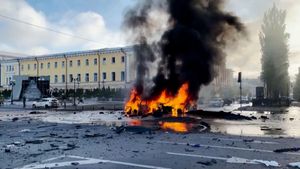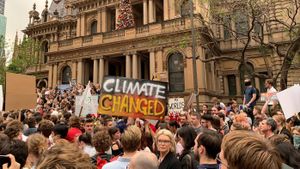Australia is at a pivotal moment, wrestling with the contentious issue of nuclear energy development. With the spotlight now on its energy policies, many are questioning why the Albanese Government has maintained steadfast opposition to nuclear power, especially when global trends seem to be shifting the other way.
The debate took center stage recently when Australia turned down requests from allies like the United States and the United Kingdom during the COP29 climate talks. These nations are eager to collaborate on nuclear energy as part of efforts to decarbonize their industries. Australia’s Climate Change and Energy Minister, Chris Bowen, reiterated their government's stance, expressing, "Australia is not signing this agreement as we do not have a nuclear-energy industry."
The minister’s claims about the abundance of renewable energy resources available to Australia, citing its vast sunshine compared to the UK, seem somewhat limited. Critics argue this mindset might leave the country lagging behind, especially as other nations aggressively pursue nuclear as part of their energy mix.
Across the globe, the narrative on nuclear energy is transforming. Leaders from various countries are speaking out, emphasizing the importance of nuclear power. For example, Ed Miliband, the UK’s Secretary for Energy, stated, “Advanced nuclear technology will help decarbonise industry by providing low carbon heat and power, supporting new jobs and investment.”
Across Europe, nuclear energy is labeled as the only clean, stable source of energy, as asserted by Poland’s Prime Minister, Mateusz Morawiecki: "The only clean, stable energy source... is nuclear energy, which is having its big day today."
John Kerry, who previously served as the US special presidential envoy for climate, added weight to this perspective, stating, "We can’t get to net zero by 2050 without having some mix of energy approaches... which is nuclear."
Even tech giants like Bill Gates have joined the chorus supporting nuclear energy, praising its safety record compared to other energy sources. According to Gates, "Nuclear energy, in terms of overall safety record, is superior to other energy methods." Sweden’s Prime Minister, Ulf Kristersson, reinforced this notion by announcing plans to construct new nuclear power plants to accelerate the green transition.
This rising global consensus starkly contrasts with Australia’s current energy strategy. Only 32 countries presently depend on nuclear power for reliable electricity, with 50 more considering its integration. Among these nations, the usage was significant, with France sourcing 65 percent of its energy from nuclear, followed by the US (19 percent), and the UK (13 percent).
Yet, Australia seems determined to stand apart. Critics fear the Albanese Government’s adherence to anti-nuclear sentiment might jeopardize the nation’s energy future. One wonders what has prompted such resistance to align with global trends. Is it political conviction, ideologically propelled opposition, or merely political posturing? The voices opposing the nuclear stance often highlight the dangers of misinformation campaigns, reminiscent of Australian Labor's portrayal of nuclear energy leading to cartoonish caricatures involving three-eyed fish.
Beyond political theatrics, the fundamental question remains: Is Australia's current strategy sustainable? The government leans heavily on renewable energy sources and has pledged to decarbonize by 2050. The challenge becomes increasingly significant as the conversation expands to other energy solutions, balancing the scale between coal, gas, hydro, and renewables.
Consider the significant role renewables play: While there's increasing recognition of their importance, do we dare put all our eggs in one basket? Without diversifying our energy portfolio, Australia's transition to net-zero emissions could become precarious.
Critics argue Labor's approach simplifies the dialogue about energy supply and security. A diversified mix may provide resilience needed against fluctuated demands, but so far, Australia seems resistant to any investment or dialogue surrounding nuclear energy.
This all raises pressing concerns. Amid the growing global energy crisis due to climate change, where stability and security of energy supply are of utmost importance, Australia finds itself isolated. Little to no collaboration on nuclear development—an adherence to what some call ideological dogma—could come at significant costs.
The broader consequences of this decision won't be clear-cut. Australia finds itself rich in natural resources, harboring the largest known reserves of uranium globally, estimated at 1.7 million tonnes. If leveraged properly, this could position the nation as not only energy self-sufficient but also potentially as a key player on the global energy stage.
Yet, with the current stance, one can’t help but feel like Australia is missing out on the opportunity to balance its energy needs with growing global calls for clean energy. Nations like South Korea are pointed to as models, successfully marrying nuclear power with renewable resources.
So, what does the future hold for Australia's energy policy? With other countries forging partnerships to build sustainable nuclear energy infrastructures, the debate intensifies. Critics demand clarity on the Albanese Government's long-term strategy—how does it plan to navigate through potential energy shortages even as lightning strikes down coal and gas dependency?
Now, more than ever, Australians need to engage with these questions. Instead of approaching the nuclear debate with skepticism, perhaps it’s time to bring intellect and reasoning to the table and examine the merits of nuclear energy as part of Australia's future energy strategy.
The world watches as attitudes shift and technology evolves. A chance to comprehend and reconsider is upon Australia, yet whether it chooses to seize this moment remains unsettled. Undeniably, the choices made today will reverberate for years to come, and the stakes have never been higher.



